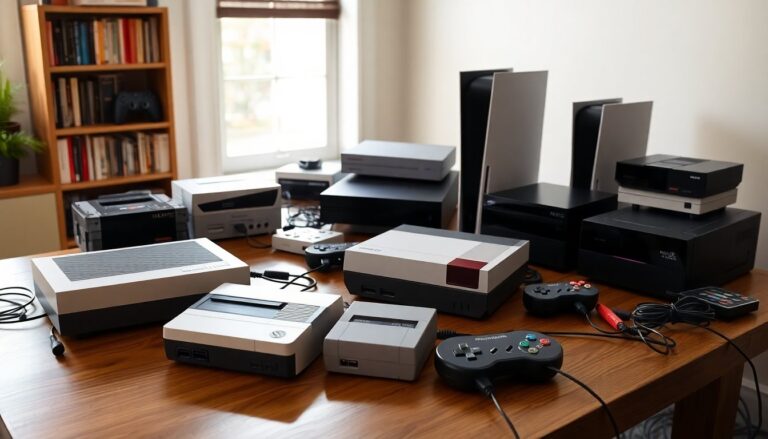Argomenti trattati
The evolution of gaming consoles
The world of gaming consoles has experienced significant transformation since its inception. From the rudimentary graphics of early 8-bit systems to today’s advanced cloud gaming solutions, this evolution reflects both technological advancements and shifts in gaming culture and consumer expectations. This article explores the evolution of gaming consoles, highlighting key milestones and their impact on the gaming landscape.
Early days of gaming consoles
The journey of gaming consoles began in the early 1970s with the release of the Magnavox Odyssey, the first home video game console. This groundbreaking device was limited, featuring simple graphics and minimal interactivity. Players utilized plastic overlays on their TVs to simulate different game environments. This marked the beginning of a new era in entertainment, where games could be played in the comfort of one’s home.
The rise of 8-bit consoles
In the late 1970s and early 1980s, the introduction of 8-bit consoles significantly changed the gaming landscape. Systems like the Nintendo Entertainment System (NES) and the Sega Master System offered improved graphics, sound capabilities, and a larger selection of games. The NES revitalized the gaming industry after the video game crash of 1983, introducing iconic titles such as Super Mario Bros. and The Legend of Zelda.
16-bit and beyond: the golden age of gaming
The next significant leap occurred with the advent of 16-bit consoles in the late 1980s. The Sega Genesis and Super Nintendo Entertainment System (SNES) showcased enhanced graphics and sound, allowing for more complex gameplay experiences. This era also marked the beginning of competitive gaming, with titles like Street Fighter II leading the charge. The introduction of cartridges with larger storage capacities enabled developers to create more intricate games.
The transition to 3D and CD-ROM technology
As technology progressed, the gaming industry witnessed a monumental shift with the introduction of 3D graphics and CD-ROM technology. The PlayStation, launched by Sony in 1994, revolutionized gaming by utilizing CDs, which provided significantly more storage than cartridges. This advancement allowed for detailed graphics and longer, more engaging narratives. Iconic franchises like Final Fantasy and Metal Gear Solid emerged during this time, setting new standards for storytelling in games.
The era of online gaming and mobile integration
The late 1990s and early 2000s ushered in the modern era of gaming consoles. The introduction of the Xbox by Microsoft in 2001 marked a significant entry into the console market, emphasizing online multiplayer capabilities through Xbox Live. This platform allowed gamers to connect, compete, and cooperate in ways that were previously unimaginable.
The rise of mobile gaming and cloud technology
In recent years, the rise of mobile gaming and cloud technology has further transformed the console landscape. Services like Google Stadia and Xbox Cloud Gaming enable players to stream games directly to their devices, minimizing the need for powerful hardware. This shift has democratized gaming, making high-quality experiences accessible to a broader audience.
The latest generation of consoles, including the PlayStation 5 and Xbox Series X, showcase cutting-edge technology featuring ray tracing, ultra-fast SSDs, and backward compatibility, ensuring players can enjoy their favorite titles from previous generations. As the future of gaming consoles unfolds, the emphasis on immersive experiences and social connectivity continues to grow.
Looking ahead: the future of gaming consoles
The evolution of gaming consoles reflects a dynamic interplay between technology and culture. From the humble beginnings of the Magnavox Odyssey to the sophisticated cloud gaming platforms of today, this journey has been remarkable. As the industry progresses, further innovations, including virtual reality and augmented reality integrations, are expected to pave the way for new gaming experiences that were once thought to belong to the realm of science fiction.

